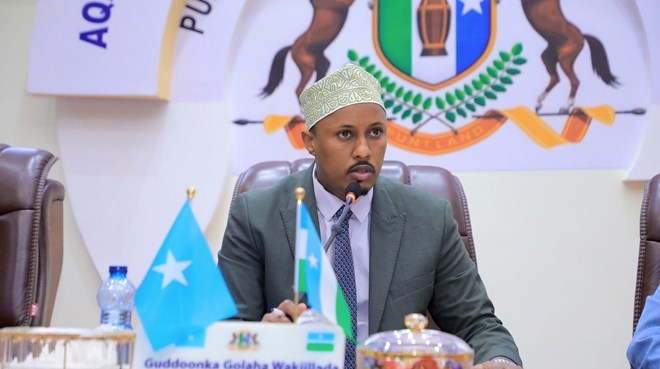
Saturday August 2, 2025

Garowe (HOL) – Puntland
regional state has strongly opposed the newly declared Northeastern Somali
Regional State, which was established last week in Las Anod and claims
authority over the Sool, Sanaag, and Buuhoodle regions.
In a press statement delivered in Garowe, Puntland
Parliament Speaker Abdirisaq Ahmed Mohamed (Qaraaje) criticized the new
administration as lacking a clear political vision and accused it of sowing
division among communities in northern Somalia.
“It is unfortunate to try to pit people who were defending
their land against each other,” Qaraaje said. “We will see how the
administration established in Las Anod can work. The Sanaag region has never
been ruled by anything imposed on it.”
The speaker emphasized that Puntland had previously
recognized the SSC-Khaatumo interim administration only under exceptional
wartime circumstances. However, he described the current development as a
direct attack on Puntland’s territorial unity and political authority.
Qaraaje also accused the Federal Government of Somalia of
being complicit in fragmenting the country, stating that “the federal
government is attempting to divide the nation into conflicting regional
entities.”
His remarks follow the conclusion of the SSC-Khatumo state
formation conference in Las Anod on Wednesday, where elders, politicians, and
civil society representatives formally announced the establishment of the
Northeastern Somali Regional State. The gathering dissolved the interim
SSC-Khatumo administration and ratified a new constitution aligning the region
with Somalia’s federal system.
The final declaration from the conference underscored the
principle of local ownership, noting that long-standing disputes were resolved
through community-led dialogue. Proponents hailed the formation of the new
state as a path toward greater inclusion, peace, and cooperation with the
federal government.
However, the declaration has triggered political tension,
particularly with Puntland and Somaliland, both of which have laid claim to the
contested regions. The development marks a significant shift in the region’s
political dynamics, potentially reshaping federal-local relations and
complicating Somalia’s fragile state-building process.






